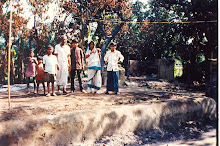For the first decade of our arrival in these shores four decades ago we celebrated Puja in our minds. It was Ma’s letters from home with occasional gifts of dhuti-punjabi reminded me of our Puja. Did I miss Puja? Leaving home seven in the morning returning at six, then showering, cooking, dining, washing dishes and heading back to library by eight, and returning back after midnight didn’t leave any time for “missing.” Telephone reminders from a handful of Bengali Hindus kept Puja alive in our minds, with occasional invitation to puja dinner. In the 1970s it was common to call our friends on Bijoya Dasami, and visit some families who would prepare Bengali sweets expecting our visit: Swati and TriptiDa in Alabama, KalyaniDi in Florida. That practice continued also in Tennessee until we came to New York. In those days we celebrated Bijoya initiated by Bengali Hindus helped with delicacies by all Hindus, participated by non-Hindus including Americans.
Bengali Hindus are known for opportunism, naturally devoid of conviction and morality. New York opened our eyes again. Not only that Puja was being held on a “convenient” weekend, but our first puja was marred when one group took “jabar-dakhal” possession of puja —a tradition brought back from home—to perform a play. “Puja is irrelevant to us atheists.” As the police arrived we soon learned that “jabar-dakhal” would not be permitted while puja-loving group battled revolutionaries taking all the fun away from the joyous occasion. We celebrated in our minds! In the 1980s our fun increased as new groups competed bringing multiple pujas in New York each holding on different weekends “for convenience.” So, our tradition of celebration in our minds also continued. American lifestyle barely allowed multiple weekends of fun! However no Bengali Muslim, Bengali Christian or Bengali Buddhist held their festivities “at convenient weekends.” 1980s was opportune for our children to show off their talents in song, poetry, play and skit learned at Bangla pathshalas; Indian dance; playing of flute, sitar, veena and other instruments. Puja provided us and our children knowing many families intimately as we practiced with our children week after week for upcoming events. Pujas brought us a bit closer, unknowingly.
In the 1990s our Puja scene turned as for the first time Bangladeshi Hindus started observing Puja according to Hindu calendar, not on opportunistic weekends. Now that number has reason to over half-a-dozen in New York City alone. In spite of busy schedule hundreds of devotees came to puja each day, with many times that on weekends, which also attracted a large number of Muslims. This year some West Bengalis will celebrate Puja by Hindu calendar, while others will chant “Joi Ma Durga” on different weekends while celebrating at home in their minds on actual days keeping a tradition alive.
Bengali Hindus are known for opportunism, naturally devoid of conviction and morality. New York opened our eyes again. Not only that Puja was being held on a “convenient” weekend, but our first puja was marred when one group took “jabar-dakhal” possession of puja —a tradition brought back from home—to perform a play. “Puja is irrelevant to us atheists.” As the police arrived we soon learned that “jabar-dakhal” would not be permitted while puja-loving group battled revolutionaries taking all the fun away from the joyous occasion. We celebrated in our minds! In the 1980s our fun increased as new groups competed bringing multiple pujas in New York each holding on different weekends “for convenience.” So, our tradition of celebration in our minds also continued. American lifestyle barely allowed multiple weekends of fun! However no Bengali Muslim, Bengali Christian or Bengali Buddhist held their festivities “at convenient weekends.” 1980s was opportune for our children to show off their talents in song, poetry, play and skit learned at Bangla pathshalas; Indian dance; playing of flute, sitar, veena and other instruments. Puja provided us and our children knowing many families intimately as we practiced with our children week after week for upcoming events. Pujas brought us a bit closer, unknowingly.
In the 1990s our Puja scene turned as for the first time Bangladeshi Hindus started observing Puja according to Hindu calendar, not on opportunistic weekends. Now that number has reason to over half-a-dozen in New York City alone. In spite of busy schedule hundreds of devotees came to puja each day, with many times that on weekends, which also attracted a large number of Muslims. This year some West Bengalis will celebrate Puja by Hindu calendar, while others will chant “Joi Ma Durga” on different weekends while celebrating at home in their minds on actual days keeping a tradition alive.
See, "Keeping Tradition Alive," The Hindustan Times daily of India, September 24, 2009; Puja Scope 02; www.hindustantimes.com


No comments:
Post a Comment